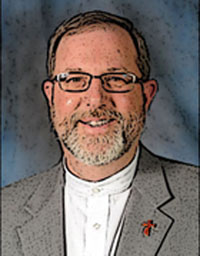Justice Perspective: Intrinsic evil of racism
by DEACON DON WEIGEL
Within a short time last month we witnessed events that should have made us consider, once again, the state of race relations in our country. On a Sunday in March more than 70,000 people joined together to march over the Edmund Pettus Bridge to recreate the 1965 event led by Dr. Martin Luther King Jr. to protest the lack of voting rights for African-American citizens.
Fifty years later the march included the first African-American president, Barack Obama, as well Rep. John Lewis and Amelia Boynton Robinson - at age 103 - both of whom were on the original march. Unlike the "bloody Sunday" of 50 years ago, it became a time of celebration, an indication of the progress that African-Americans have made.
Unfortunately, some stark realities interrupted the reverie and caused us to deal with the fact that racism is still a part of the fabric of our society.
Just a few days before the march the U.S. Justice Department issued its report on the investigation into the City of Ferguson, Mo., police department that found consistent evidence of racial bias in its operation.
Then two students of a University of Oklahoma fraternity were expelled after a video went viral, of them gleefully engaged in a racist chant that included references to lynching.
These incidents of racism come at us in disconnected stories, and can sometimes lead us to believe that they are just isolated incidents and not part of a larger pattern. But the reality might be different.
Here are some facts close to home. We have a high degree of segregation in our own backyard with more than 90 percent of the population in the suburbs being white and only 3 1/2 percent African-American.
Recent reports have also highlighted the disproportionate application of "justice" between whites and people of color in Western New York. African-Americans are routinely arrested more often for the same crime as whites, are convicted more frequently (as opposed to being given probation), and are given longer sentences than whites.
The truth is that the kind of racism that we witness today is much more subtle than 50 years ago. Blatant discrimination has been banned by laws in housing, employment and many other areas, but prejudice and bigotry persist.
The Church has been very clear about its teaching on racism. Most forcefully, the U.S. bishops issued a statement in 1979 titled, "Brothers and Sisters to Us" that identified racism as not just one sin among many, but a "radical evil that divides the human family and denies the new creation of a redeemed world." The Faithful Citizenship document issued by the bishops identifies racism as an "intrinsic evil" - an act that can never be justified.
Like so many other problems in the world, the first step in eradicating racism has to start with each of us. We each need to examine our own prejudices and biases to discover the roots of racism in ourselves. We have to be honest in admitting those tendencies that "allow another's race to influence our relationship and limit our openness."
But we also need to be courageous in speaking out about the dignity of each one and everyone - in our homes, in our workplaces and schools, and from our pulpits.
Racism has not been eliminated among us yet. The Gospel calls us to work for that day when it has become a thing of the past. What are you willing to do to make that happen?
Deacon Don Weigel is the associate public policy coordinator at Catholic Charities of Buffalo and is a Global Fellow with Catholic Relief Services. He may be reached at deacondon@gmail.com.




